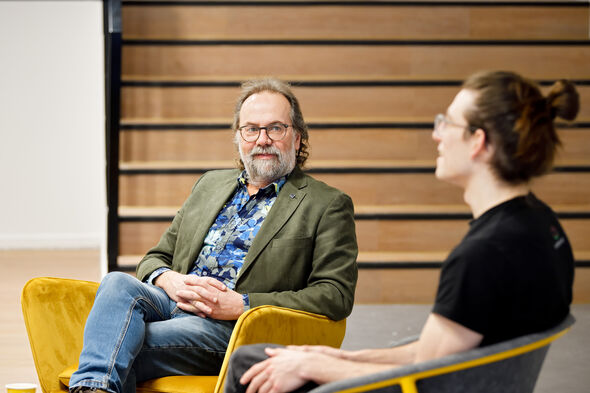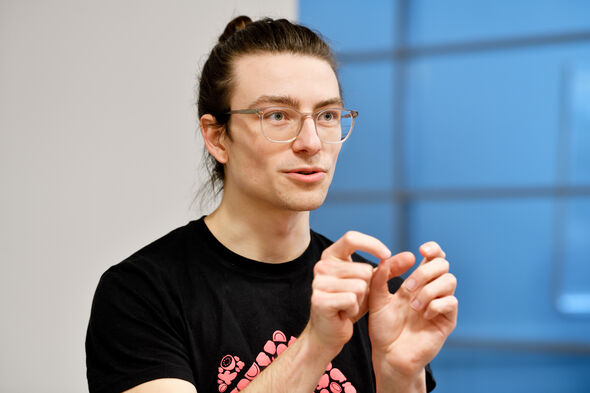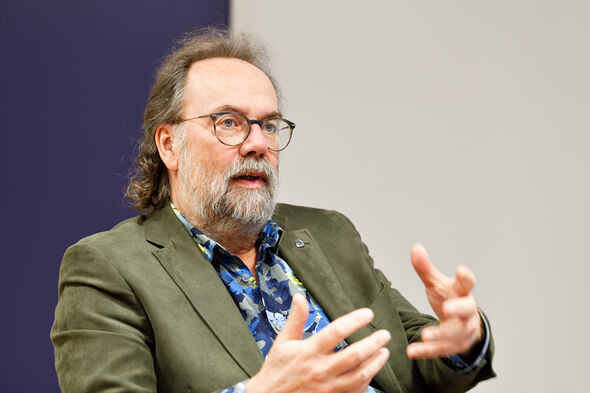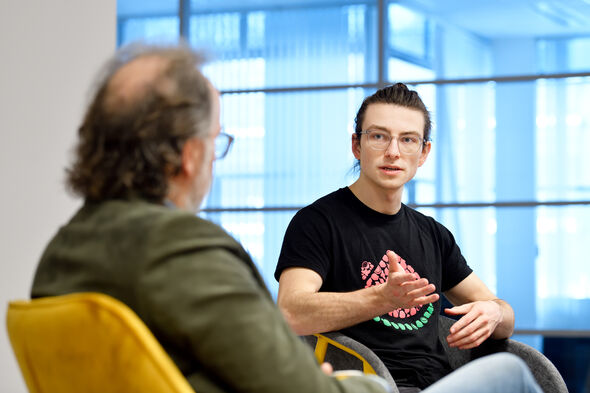Finding the freedom to pursue your passion
Joint interview Maarten Steinbuch and Buster Franken
Read more- The University , People
- 24/02/2021
Finding the freedom to pursue your passion
Not even a week after the official opening of the Multimediapaviljoen - the new permanent home of Eindhoven Engine - Maarten Steinbuch, Professor in Systems and Control, and Buster Franken, an enterprising TU/e alumnus who recently graduated in data science, meet each other in the building’s central hall. Both Steinbuch and Franken have greatly anticipated the conversation. Although separated by a good one and a half generations and in completely different phases of life, they share a, perhaps surprisingly similar, passion and enthusiasm for their work.
Heroes Past and Present
The theme of this lustrum year, which marks TU/e’s 65th anniversary, is ‘Heroes like you.’ In keeping with this theme, Cursor will publish a series of double interviews throughout the year with the motto ‘Heroes Past and Present.’ TU/e employees with proven track records, still working at the university or no longer under employment, are matched with their counterparts from today. In all possible fields: science, policy, or student life. Professor Maarten Steinbuch and alumnus Buster Franken are the first in our series.
The topic of conversation between the two men is 'the enterprising university'. Worldwide, the TU/e is renowned for demonstrating the social and economic impact academia can have. Indeed, the university leads the rankings in its cooperation with external companies, as is evidenced, amongst others, by the many collaborative publications it produces. In addition, the university receives a steady stream of foreign delegations wishing to experience first-hand the TU/e's success. Yet how did the university, which celebrates its 65th anniversary this year, achieve this enviable position?
Steinbuch: "It is not so much ‘the university’ that achieves something. Rather, it is all the work of its people - unique individuals who use their own energy and conviction to create successful spin-offs, inspire others to collaborate with companies, hold on to a long-term vision, and dare to take risks. As far as I am concerned, the question is primarily: 'How can you, as a researcher or a student, have a positive and lasting impact upon business as well as society? Such an endeavour can only succeed if you work with other people.”
Freedom
Having worked as a researcher at Philips Research for twelve years, Steinbuch made the transition to becoming a Professor in Systems and Control at TU/e. "At the time I really appreciated the strong sense of solidarity at Philips. That was very special, and when I came to work at the TU/e, there was definitely a lot less of that. However, what I did find here was an enormous sense of freedom. Here, I could really focus on realising a long-term vision of where my field should go in order to make a meaningful contribution to society. Over the past twenty years, as an entrepreneurial professor at TU/e, I have seen that there is actually very little difference between a good researcher and a good entrepreneur. In both roles you need to have a clear, long-term goal in order to be successful; you have to be persistent and have a strong will in order to achieve that goal.”
Buster Franken wholeheartedly agrees. "Yes, the importance of having a long-term vision, focusing on it strongly and giving it your all - that is also exactly how I experience it. I now have a rough plan in my head for the next fifty years. You really need that long-term perspective in order to realise major transformations. In the beginning, this was quite difficult. Everyone gave me well-intentioned advice, but this often distracted me from my long-term focus. Whilst, at the time, this caused a lot of doubt, it is now gradually becoming much less significant.
Steinbuch: "To a certain extent, this was true for me as well. Whilst I knew perfectly well what I wanted to achieve, at the same time, I could be very insecure. However, I think that is a good thing, because uncertainty leads you to strive for perfection. As a researcher, that is a very good character trait! That insecurity fulfils a very important function, and you have to be able to find a place for it in your work.”
Uncertainty leads you to strive for perfection. As a researcher, that is a very good character trait!
Drive
However, how does one manage to achieve such a focus in the long term, whilst simultaneously doubting whether what you are doing is in fact good enough? Drawing from his own experience, Steinbuch says: "Every researcher must be strongly motivated because in order to want to be a researcher for forty years, you must have your own drive. You do not have a boss who tells you what to do. Of course, the same is true of entrepreneurs. That drive is a strong similarity between researchers and entrepreneurs."
Franken: "At the beginning of my studies, I found that drive in the development of perfect robotic finger control for people who had lost an arm. I soon discovered that the challenge is not so much the mechanical refinement, but the brain-interface, in which artificial intelligence and data science play an important role. Unfortunately, I think that real commercial applications in this area are still at least fifteen years away. However, the combination of AI and data science can achieve so much in many other areas as well, and is already able to solve concrete problems today. It is from that perspective that I founded Fruitpunch AI. Working from a long-term vision, looking towards the social and commercial problems and opportunities that exist today.”
New Initiatives
Yet Eindhoven's success as an enterprising university is not only due to the individual researcher or the enterprising student. As an organisation, the TU/e has also played an important role. Steinbuch agrees: "Perhaps TU/e’s best idea in order to stimulate cooperation with companies and entrepreneurship has been to enable as many new initiatives as possible. Such freedom to set up new ideas is very characteristic. For example, around 2010, after successfully setting up the master's degree and PDEng Automotive, I was keen to also develop a bachelor's degree in Automotive, but I did not know exactly how. So, I asked a group of students from the honors class to draft a proposal. Within three months, the students had developed a complete design for the study programme - it was unprecedented and extremely exhilarating. The Executive Board was very quick to approve the proposal and funding was arranged, and we were able to get started in no time at all.”
Franken: "I experienced something similar during the start-up phase of Fruitpunch AI. Artificial intelligence was booming worldwide and several hubs surrounding Dutch universities were already being developed, yet in Eindhoven, everything remained very quiet, even though there is a lot of knowledge and potential here. Due to the apparent lack of any kind of community, I decided to set one up myself. Funnily enough, Maarten Steinbuch attended my very first pitch during one of the data science lunch meetings, and he immediately offered to contribute ten thousand euros from his own group. However, this ultimately turned out not to be necessary as a substantial capital injection from Mark Mietus of the Data Science group allowed me to get started very quickly. That gave me an enormous boost.”
Steinbuch: "Yes, I remember this well. Not only did Buster have good ideas, but he also managed to put them forward with such conviction and personal power—I immediately knew that we had to take this further. It also fitted in seamlessly with the rapid development of AI at TU/e. The university has now managed to carve out an important place in the AI landscape for itself with the new AI institute: the Eindhoven Artificial Intelligence Systems Institute (EAISI). This has only been made possible by taking quick action and capitalising on the opportunities.”
Well-appreciated
Franken: "What I also really appreciate about TU/e is that there is not too much attachment to egos. Even as an ordinary student, it was very easy for me to join in with the establishment of EAISI - albeit after a little persistence - and now I am a programme advisor. Apparently, my contributions proved useful. The fact that I was 'only' a student hardly played a role; I was well-appreciated. I really enjoy that here, people look at what you can do, and not so much at who you are.”
In their conversation, both praise the development of Challenge Based Learning. This new and now highly respected educational method has been further developed from the Problem Based Learning (PBL) and User, Society and Entrepreneurial (USE) curricula, into its current form within the TU/e Innovation Space. For both men, the method serves as a model for their own work. As a student, this method was very beneficial to Franken. "It really opened up my brain; I came into contact with completely new fields of study. This form of education, including working in student teams, gave me an enormous amount of freedom. Indeed, it put me on an accelerated path towards becoming an entrepreneur. I think that everyone should get more involved with this."
However, Steinbuch responds in a cautionary tone: "Whilst I do understand what Buster is saying, this type of education does not suite everyone. For me, the key word here is 'diversity'. Not all students have to become entrepreneurs, nor do they necessarily have to focus always upon the societal impact of their work. Researching and innovating is teamwork, and you always need a set of different qualities and characters in order to succeed. Highly specialised scientists are very good at complementing entrepreneurial individuals, or those who might be more people-oriented. That is, provided they have learnt to innovate in a multidisciplinary way, and in good collaboration."
Ethical aspects
Franken: "This is true of course, however, I still think that every science student and engineer should be aware of the impact that the discipline has on society, and on the more ethical aspects. For example, social media that are designed by scientists who only focus on the technology, and not on the social challenge with which they must also engage, are undesirable. The result is all kinds of addictive algorithms that lead to filter bubbles, causing society to grow apart, as it does at the moment. If engineers had focused more strongly on solving real problems, this could have been prevented."
Social media that are designed by scientists who only focus on the technology, but not on the social challenge with which they must also engage, are undesirable.
Steinbuch agrees with this completely. "This will be the most prominent topic of the coming decades. Focussing on impact is very popular at the moment. It is a good thing that the TU/e is working with the 'new reward' method, meaning that having an impact will also be valued, and not only scientific quality. With the Eindhoven Engine we also try to realise projects along the axis of the sustainable development goals of the United Nations, the UN-SDGs. As a new addition, we are now also focussing on the aspect of inclusiveness. For example, together with the Eindhoven Library, we are engaging in a project on low literacy. If you bring social researchers and AI specialists together, you can come up with completely new solutions."
Insular culture
This approach sets the TU/e apart from other universities, both in the Netherlands and abroad. According to Steinbuch, this ought to be given more publicity. "Good PR is very important for the university. Not only does it attract more students and good researchers, which is very important for the region; above all, it can also create a strong sense of 'we-ness', strengthening the solidarity and cooperation between groups and departments. I still remember well how our Solar Team won the first world championship in the Cruiser class in Australia, which became major national news. It was as if, in one swoop, a part of the existing, somewhat insular culture, which had historically been very strong between the various research groups at the TU/e, disappeared. As a result, companies and social institutions also found it easier to reach out to us. Hence, the fact that we are increasingly trying to sell ourselves to the outside world as TU/e, also internationally, is very useful and I applaud it very much.”
European centre of excellence
What we see here are two life stories, with two different perspectives. Whereas Steinbuch is already thinking about his retirement in a few years' time, Franken still has an bright future of opportunities stretching before him. How then do both men envision the next 35 years, culminating in the university’s 100th anniversary? Franken: "AI is still in its infancy, and TU/e has a unique opportunity to become a European centre of excellence in this field. We have to abandon small-town thinking and let go of this idea that the distances between the Dutch universities are very large. In addition, I really do think we have an obligation to further develop the social and ethical thinking of both students and engineers. That could really help our world move forward."
Steinbuch adds: "The greatest strength would be to connect AI in this region with our industrial ecosystem in High Tech systems. We really have a unique global position here in the Brainport region, and hence we have the opportunity to be ahead of the curve in this respect."
He also takes a stand for the university as an institution. "Increasingly, you hear people say that, a few decades from now, the universities will become completely obsolete, that knowledge is freely available online, and that diplomas and research will no longer be bound to the local context. I do not share that opinion. What will change the world in the coming decades is not knowledge, but wisdom. Concrete experience, gained in pilot projects, in partnerships with various external parties, through Design Thinking, Systems Thinking, and Challenge-based Education and Research, is very valuable and cannot be copied. In future, universities will continue to distinguish themselves in this way. I call this the 4th Generation University; a university that continues to have a positive impact on society and the development of the local ecosystem. That is the future, and TU/e has excellent credentials to be a guiding light in this respect."
The interviewees
Buster Franken was born in Eindhoven in 1996. He completed the Bonnefanten College voor Beeldende Kunsten, where he pursued his passion of the arts. However, he became fascinated by technique and decided to follow the program Mechanical Engineering at TU/e in 2014. He also followed a Pre-Master Data Science and graduated in 2018 with a thesis on the development of 3D brain structures in a lab environment for testing drugs for Alzheimer’s disease and for brain computer interfacing. He launched the foundation FruitPunch AI in 2018, which was accredited as a TU/e student team the following year. He was involved with the launch of EAISI in 2019 and currently works there as AI Program Advisor. He received venture capitalist funding from LUMO Labs in 2020 with FruitPunch AI, and he has been acting as the company’s CEO since that time.
Maarten Steinbuch was born in Zeist in 1960. He studied Mechanical Engineering at Delft University of Technology from 1979 until 1984, where he also obtained his PhD in Systems & Control (1989). From 1987 until 1998 he was with Philips Research Labs, and he was manager of the Dynamics and Control Group at Philips Center for Manufacturing Technology between 1998 and 1999. He was appointed Full Professor of the Control Systems Technology group at TU/e in 1999. Between 2006 and 2017, he acted as scientific director of the 4TU Research Centre High Tech Systems. In 2013, Steinbuch was appointed Distinguished University Professor at TU/e. He was scientific director of the TU/e High Tech Systems Centre between 2014 and 2020. In 2015, he won the first Academic Society Award of the Royal Netherlands Society of Engineers (KIVI). In 2016, he was honored as Simon Stevin Meester, the highest Dutch award for scientific technological research. He is CTO of Eindhoven Engine since 2018.




Discussion